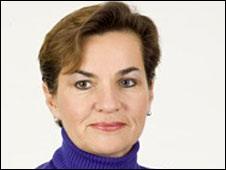New UN climate chief calls for more ambition
- Published

Ms Figueres is to assume her post on 8 July
The incoming head of the UN climate convention has said rich nations must pledge bigger emission cuts if climate change is to be tackled effectively.
But Christiana Figueres said she was confident that leaders would meet the challenge "because humanity has to meet it - we don't have another option."
Ms Figueres was speaking at a two-week session of UN negotiations in Bonn.
She said the mood was "constructive"; but major differences are evident between different groups of countries.
In particular, some developing countries are angry at what they see as western nations' attempts to insert new loopholes into regulations on how emissions from land use change are accounted for, which could allow western nations to cut actual emissions by less than they have pledged.
Developing countries are also once again asking for more ambitious cuts from the west.
Analyses suggest that pledges made in Copenhagen, if implemented fully, would put the Earth on course for 3C or even 4C of warming since pre-industrial times, rather than the 2C that many countries say they want to stay below.
"[The pledges] are not ambitious enough to protect the most vulnerable of the Earth, and they need to grow," Ms Figueres told reporters.
"Let's admit the glass is not half full yet; but is starting to fill again."
Ms Figueres, a Costa Rican diplomat and 15-year veteran of the UN climate process, takes over from the current UNFCCC executive secretary Yvo de Boer early next month.
Confidence shaken
Mistakes had been made, she said, at December's Copenhagen summit, which was intended to provide a comprehensive package of measures to combat the causes and impacts of climate change - the conclusion to a commitment made by all governments at the 2007 summit in Bali - but which ended with no such thing.
In particular, she said, negotiations in the final days, between small groups of nations chosen by the Danish host government and some important nations from the developed and developing worlds, lacked transparency and inclusiveness.
"What we need to be mindful of is that all interests that will be there among parties of the UNFCCC are represented," she said.
"That did not happen in Copenhagen."
The European Commission's Laurence Graff said events in Copenhagen had damaged public confidence in the UN process.
"From the public side, there was such a wide gap betwen the expectations at Copenhagen and what it delivered that it was very damaging indeed.
"There is a trust issue in relation to the process - and hence the need, here and later, to show that the process is delivering."
She also acknowledged the effect on public opinion of questions that have been raised over the integrity of climate science, but said the science was solid, and that negotiations should move ahead on that basis.
'Holocaust' warning
Looking ahead to this year's summit in Cancun, Mexico, Ms Figueres said it was wrong to think in terms of achieving or not achieving a legally-binding treaty.
Instead, she said, the summit should be about delivery - following through on pledges to curb emissions, and - on the part of the rich - to provide money to help developing nations adapt to climate impacts.
Agreements on issues such as reducing deforestation could be an important part of this, she noted.
But it is clear that developing countries want more.
Quamrul Chowdhury, principal negotiator for Bangladesh, emphasised that his country and its allies were looking for nothing less than "a legally-binding, ambitious, fair and balanced" agreement.
"At Bali, we had the mandate to complete our task at Copenhagen," he said.
"Unfortunately, we couldn't deliver at Copenhagen; and if we can't deliver at Cancun... it will be unfortunate, it will be tragic, it will be a holocaust."
This meeting ends on Friday, and will be followed by one or two more sets of negotiations before the Cancun summit in November and December.
- Published17 May 2010